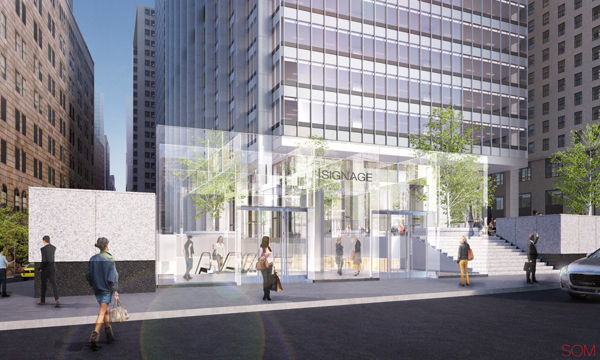
Fosun has dropped its request to modify its deed restriction to allow for glass pavilions over the entrances to its underground retail space at 28 Liberty Plaza after changes to the deed restriction modification process.
BY COLIN MIXSON
A Downtown developer has shelved plans to erect glass pavilions at Chase Plaza at 28 Liberty St. —at least for now — shortly after a change in city law that would make it more difficult.
Developer Fosun had sought to build three plate-glass structures around the entrances to the 200,000-square-foot shopping center it is currently building under the plaza. But the pavilions — ranging in height from 11-feet and 17-feet tall — would require a modification of the property’s deed restriction, which prohibits the construction of any new structures more than six-feet tall. The height-limiting deed restriction was put in place as a way to protect sight-lines around the plaza at a time long before the Landmarks Preservation Commission was created to provide such protections.
Last July, a joint meeting of Community Board 1’s Financial District and Planning committees approved a draft resolution supporting a deed modification to allow two of the three pavilions, but preservationist Alice Blank rallied locals at the subsequent full board meeting, where members voted to table resolution, according to a board staff member.
“Alice Blank really kind of lead the opposition on this,” said Diana Switaj, director of planning and land use at CB1.
Reps for Fosun claimed the new structures were necessary to provide handicapped access, but Blank and her preservationist cohort weren’t buying it, and objected to the style and height of the new structures, according to Switaj.
Another major point of contention was the transparency — or lack thereof — of the glass structures, with opponents arguing that the pavilions would be more opaque than what renderings provided by Fosun showed, Switaj said.
“I think that was a general sentiment for people opposed was that in these renderings the pavilions appeared to be almost completely transparent,” Switaj said, “but Alice believed that they would not be as clear as depicted.”
But more than the local opposition, what most likely shattered the plans was a change in city law that makes modifying deed restrictions a much more cumbersome process than before.
Councilmember Margaret Chin and Borough President Gale Brewer championed the change, signed into law late last year, in the wake of the Rivington House scandal, in which a developer was able to sell off a Lower East Side nursing home to become condos for tidy profit after the city quietly lifted a deed restriction on the property.
Under the new law, any deed-restriction modification requires three separate city bureaucracies — including the Mayor’s office — to review and sign off on the move, as well as a statement listing factors proving that the modification is in the best interests of the city.
Reached for comment, Fosun spokesman George Shea would not say what led the developer to pull back on the pavilion plans, but he provided a statement that left open the possibility that Fosun may try again.
“We will reevaluate the additional glass entryway pavilions in the future,” he said.

































